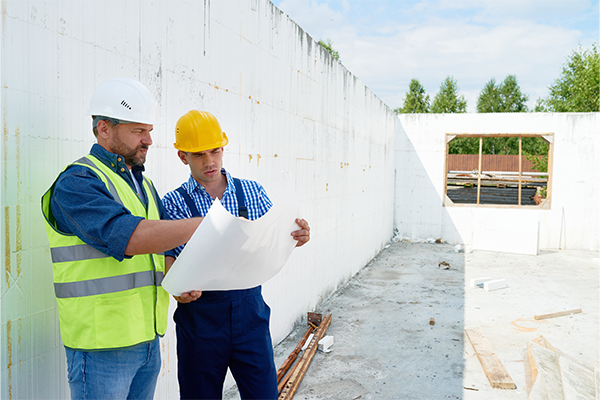A white card is a mandatory certification for anyone working in the construction industry in Australia. It's an official document that certifies individuals have completed general safety induction training, which covers topics such as identifying hazards and risks on site, correct use of personal protective equipment (PPE) and workplace health and safety legislation. The Construction Induction Card short course aims to ensure all personnel are aware of their responsibilities when it comes to safe work practices on a site.
Individuals must complete this initial training before they can gain access to any building or construction site throughout Australia. Once certified by completing the relevant approved courses, workers will be issued a physical wallet-sized plasticised version or digital PDF version of their white card – this should be kept at hand whenever attending sites so that employers can easily verify its validity if needed.
In this article, we will discuss everything there is to know about the elusive white card, starting with the difference between the white and construction induction card.

Construction induction card: what’s the difference?
A white card is an official name for the general construction induction (or ‘Green Card’) card issued by WorkSafe in Australia. The card is designed to demonstrate that an individual has completed the general construction induction training program. The training covers basic construction safety, health and environmental issues.
However, a construction induction card is specifically issued by the Construction and Property Services Industry training board. It is designed to demonstrate that an individual has successfully completed the construction induction training program. The training covers a more comprehensive range of construction safety, health and environmental issues than the white card and can be used for higher-risk construction activities.
Do I need a white card?
A white card is essential if you would like to commence work in certain industries. White cards are required in the construction industry, mining and quarrying industries, scaffolding work, demolition work, high-risk work (including any activity involving working with asbestos), telecommunications sector and transportable premises.
The legal requirements associated with white cards in Australia include the following:
- It is a legal requirement that any person who carries out construction work must hold a valid white card issued by an approved Registered Training Organisation.
- The card shows that the holder has completed the general induction training, which specifically covers occupational health and safety issues related to working in the construction industry.
- It is also required for people wanting to do additional or specialised courses such as asbestos awareness or scaffolding inspection qualifications, as well as for visitors on-site with no intention of doing manual labour but could be exposed to risks specific to the site environment, e.g. contractors delivering materials.
A white card is needed for construction work jobs, but many other professions require this certification. Other roles that require a white card include:
- Plumber
- Electrician
- Painter or Decorator
- Carpet Layer / Floor Installer
- Handyman / Maintenance Personnel
- Demolition Worker
- Landscaper / Gardener
- Roof Tiler / Installer
- Asbestos Remover
- Fire Protection Technician
- Air Conditioning & Refrigeration Engineer
- General labourer
- Glazier
The owner-builder of a property does not require a white card. However, if they are doing any work on commercial construction sites or have employees working with them, then they must obtain the relevant occupational health and safety qualifications like anyone else. Additionally, if the project involves working with asbestos or hazardous materials, then they may be required to complete additional training and obtain a relevant licence for that type of work.
Is the white card national?
The white card system is used in all states and territories of Australia. That said, each state has its own system for issuing and recognising different types of cards, just like driver's licenses or other identification cards. This means that if you have a white card in Victoria, it is only valid within the state.
If you decide to take on work in another state or territory, you must apply for a white card issued in that state. For example, if you move from Victoria to New South Wales, you can apply for a white card online at the Service NSW website or through an accredited training provider in person. In order to obtain your card, you must complete general construction induction training with an approved and accredited trainer who is authorised by WorkCover New South Wales (SafeWork).

How to get a white card
If you’re planning to enter the construction industry, you’ll need to complete construction induction training. Are you planning to work in Victoria? You’ll need a Victorian Construction Induction Card to be able to enter any work site.
Luckily, TAFE Gippsland offers an accredited short course where you’ll be able to receive expert training while quickly earning your white card.
The Construction Induction Card short course offers new and prospective construction workers the chance to learn the fundamental principles of occupational health and safety (OHS) and workplace injury prevention.
In this course, you will learn about:
- Responsibilities of both employers and employees - Employers have a responsibility to provide their employees with the right training and equipment, as well as a safe working environment. Employees must follow safety instructions, use appropriate PPE, report any hazards they observe on the job site, and attend regular refresher courses.
- Health and Safety Committees - You'll gain an understanding of the roles that members play in creating safe working environments, identify potential workplace hazards and risks, understand legal requirements for reporting accidents or injuries to supervisors/managers, develop strategies to reduce risk through education and training initiatives as well as developing policies relating to safe work practices. Additionally, you will be taught how meetings should be conducted effectively, with all participants having their say so that everyone feels included in decisions made.
- WorkSafe Inspectors - You will learn that inspectors have the power to enter premises and inspect for workplace health and safety compliance. They also have powers to issue notices, including improvement or prohibition notices, as well as enforceable undertakings in order to ensure workplaces are adequately managing their health and safety risks.
- Workplace Behaviour - You will learn about respecting coworkers' rights to a safe working environment, following ethical practices in the workplace, and using appropriate language when communicating with colleagues or customers. It may also include topics on diversity awareness and how to handle bullying or harassment in the workplace.
- Hazards and Risk Assessments - You will learn about the different types of hazards that exist on building sites and other work environments. You will also gain an understanding of how to identify potential risks and develop strategies for assessing, controlling and monitoring them. The skills gained in this course are essential for any worker who is likely to be exposed to hazardous materials or situations while carrying out their duties. Additionally, by completing the white card certification, you demonstrate your commitment to following safe working practices, which can help protect yourself as well as those around you.
- Safe Work Method Statement/Job Safety Analysis, Acts, Regulations, Codes of Practice - You will learn how to identify hazards and risks associated with work activities and apply the principles of Safe Work Method Statement/Job Safety Analysis (SWMS/JSA) when developing safe systems of work. You will also gain an understanding of relevant Acts, Regulations, Codes of Practice and Industry Standards that may impact your workplace safety. Additionally, you will become familiar with the importance of implementing hazard control measures in order to reduce potential harm or injury from hazardous situations.
How much does a white card cost?
The Construction Induction Card course at TAFE Gippsland costs $208. For this price, you’ll not only receive expert training at an accredited TAFE, but you’ll be able to walk away with the confidence that you are ready to safely enter and work on any construction site in Victoria.
How long does a white card last?
Believe it or not, Victorian white cards stay valid forever. That said, if you’ve taken a break from construction work, it’s recommended that all workers take a refresher course before returning to a job in the construction industry. This will ensure that all health and safety procedures are top of mind when re-entering the construction workforce.
In conclusion, the white card is a mandatory certification for anyone working in the construction industry throughout Australia. It certifies that individuals have completed general safety induction training and covers topics such as identifying hazards and risks on site, correct use of PPE and workplace health and safety legislation.
The course at TAFE Gippsland costs $208, but your Victorian white card will be valid forever. Plus, you’ll learn a great deal about important topics such as workplace behaviour, employer responsibilities, risk assessment and other safe work methods. Being familiar with these matters is crucial so that everyone can stay safe on work sites.
If you’re ready to commence a career in construction, the white card is your ticket to learning all the relevant health and safety procedures and ultimately, it will gain you access to that work site. If you’re ready to take the next step towards your career in construction, contact TAFE Gippsland today to get your white card in no time!